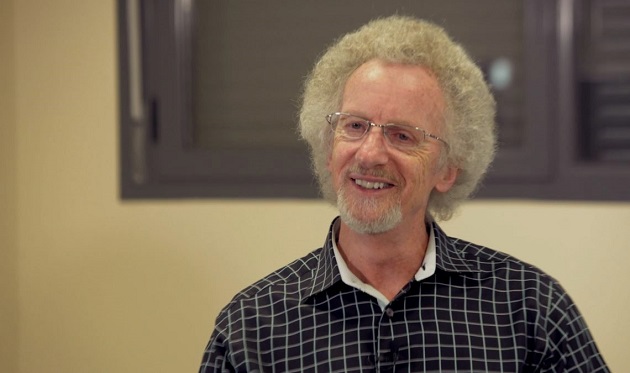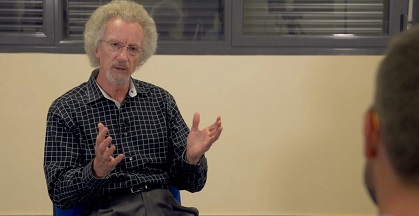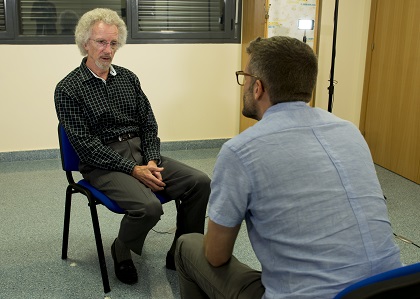“The gospel transforms individuals, communities and all of society”
Author Philip Yancey believes Christians are “the Jesus left behind” in a world in which people respond to the gospel when it is shared through “acts of mercy”. Read interview and watch video.
17 OCTOBER 2016 · 11:50 CET

Philip Yancey believes Christians need to be aware that they are the representatives of Jesus in a world that needs to see the church in action.
Author Philip Yancey said “Christians should look radically different from the world around them” in an excerpt of the interview Evangelical Focus published three weeks ago.
The first part of the interview - in which the Christian author expressed his views about Presidential candidate Donald Trump - went viral on internet and was quoted and republished by dozens of media outlets.
In the second part of the interview, Yancey talks about the role of Christians in secularised societies. Watch video and read transcript:
Question. You define the church as the ‘the people Jesus left behind’. What does that mean?
Answer. Well, if you are in the Old Testament, and you ask the question ‘what is God like?’ probably a young Jewish person would say, ‘God is scary, God is like Mount Sinai, smoking and thundering, like a volcano… scary!’ If you ask one of Jesus’ disciples what is God like, they would say, ‘well, I know this may be hard to believe but God is like this person over here, God is like Jesus. He told us he came from the Father to show us what the father is like’.
But Jesus did not stay very long. He worked, as far as we know for maybe three years and then he left! And he actually said, ‘it is for your good that I am going away because now I am turning the mission over to you’. For the world to understand what is God like now, the church is the answer to that.
So, the Apostle Paul, as he reflected, he used the phrase “we are the body of Christ” more than 30 times. Think about that. We are the body presence of God in the world. God used to be present in his son Jesus, but Jesus left. And he said ‘It is actually good that I am going away, because I am leaving you behind. And I am giving you the mission of informing the world and showing the world what God is like, and sharing the good news of the gospel’.
So, that’s not the way the phrase “left behind” is usually used, because there are some books with that title, but for me, the church is the ‘Jesus left behind’. Because the only way the world would know what Jesus is like, what God is like, is through the church, the ‘Jesus left behind’.

Q. You have been interviewed in all kind of media. In a secular context, people could ask you questions like: ‘What good has the church done for society?’ and ‘Where is God?’ How do you answer?
A. I was actually asked that very question on a secular radio station. I think they were disappointed to be interviewing a Christian author, ‘why am I wasting my time with this religious stuff’. Finally, the person turned to me and said, “well, you wrote this book called What good is God, tell me, what good is God? What has religion ever done that was good?”
And I said, “I would answer that on several different levels”. First is the level of individuals. I could tell you stories of people in prison, of prostitutes, of alcoholics, of drug addicts, of people caught up in slavery and trafficking, people with leprosy… People who were at the very low in terms of how they fit in society, and their own feelings of themselves – their self-esteem. And they were transformed, truly transformed when they believed ‘God loves me’, ‘God accepts me’, ‘God can change me’. I am a journalist, I have reported hundreds of stories of these people, and I have to just take them at their word. So, on the individual level, I have seen many people who are transformed.
But not just that. In the community level, I wrote a book called Where is God when it hurts? So, I would say, kind of like in the last question, I have seen that again and again, where, after a hurricane, after a tsunami, after an earthquake, the church pours its resources and appears. Who were the first people who got the Ebola virus from other countries? It were Christian doctors, they were missionary doctors. The church is on the front-line, the church is that community of support when the world needs it.
And then, eventually, it affects all of society. You go on the internet and look at sites like Transparency International. What are the least corrupt countries? What are the most prosperous countries? What are the countries who care most about the environment? What are the countries that have most gender equality? I’ve done all of those and in each one, about 19 out of the top 20 countries will be countries with a Christian heritage.
They are not necessarily strongly believing countries now. So, in Scandinavia not many go to church, and a lot of people do not even believe in God. But the gospel has its effect of changing all of society. Look at Scandinavia, they used to be tribes of waring Vikings, and now they are not, they are civilised, they are charitable, they are honest, they care about the environment.
On all three of those levels, the individual, the community, the society, the gospel has a transforming effect.

Q. You said activists are one of the three kind of people who administer grace very well nowadays (the other two are artists and pilgrims). What do you mean by that?
There are some parts of the world, were the gospel is news, it is something they have not heard before. I have been to these places, like the Philippines, parts of Brazil, parts of China were you just come and tell the story of the gospel. About God’s love, God sending his son, etc. And people say, ‘wow, this is wonderful! I want that!’
But it is on longer news in Europe, in the United States. We have heard it, your museums are full of the story, so it does not sound like news. And even in my lifetime. Early on, Billy Graham could go to any stadium in the world and say: ‘The Bible says…’, and people said: ‘I must believe it, it must be right. Billy Graham said, the Bible says it’.
Now people would say: ‘So what? I do not believe the Bible, it is a book of myths. The Quran says something else, the Upanishads say something else Why should I be convinced?’
A theologian from Croatia used a phrase that helped me a lot. He said that in the old days – like that Billy Graham era – we could communicate the gospel head to head. I know the truth, I will proclaim the truth, and you will say, ‘Oh yes, this is true’, you will believe it.
But it does not work so much anymore. We live in a pluralistic society where there a lot of different ideas floating around. The most effective communication now is what he describes as hand to heart to head. So, we reach out through our hands and do acts of mercy, we live the gospel as Jesus did. With acts of healing, acts of compassion. We live it, we affect people, we show up when there is a human need. And then people wonder, ‘why do they care about me?’ It touches their heart. Why do they care about sexual trafficking? Why do they care about the environment? Why do they care about poverty and about earthquakes? Why did they spend all this time rebuilding my house? And that opens their head.
So, hand to heart to head. The acts of mercy touch one’s heart, and the person who is touched wants to know, ‘why, what’s behind it, what is your motivation?’ They are open to receiving the gospel in a different way than if I just showed up at the door, knocked on the door and said: ‘I want to tell you the truth’. They are touched by the truth before they even know it.
Published in: Evangelical Focus - world - “The gospel transforms individuals, communities and all of society”
